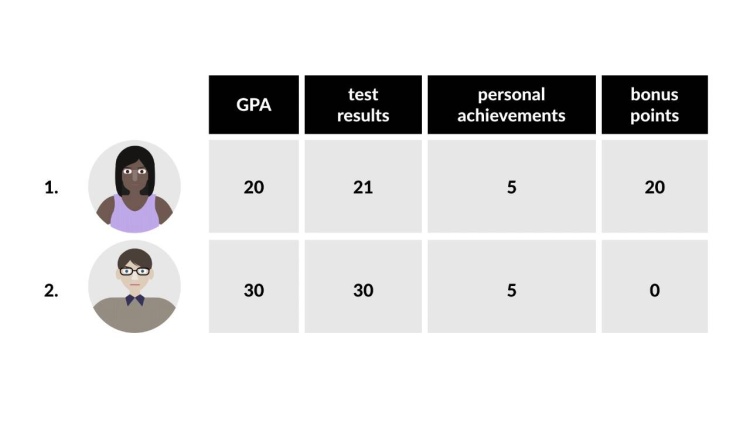Gratz v. Bollinger
United States Supreme Court
539 U.S. 244 (2003)
- Written by Jamie Milne, JD
Facts
Jennifer Gratz and Patrick Hamacher (plaintiffs), who were both White, applied for admission to the University of Michigan (the university) (defendant) in 1995 and 1997, respectively. Both were denied admission. Undergraduate-admission decisions were based on multiple factors, one of which was race. The university admitted almost all applicants of certain races deemed underrepresented if the applicants met academic qualifications. In 1998, the university adopted a point-based admissions system. Different point values were assigned to different factors, and an applicant could score up to 150 points. Point bands generally delineated the admission decisions. Some applicants received additional personal consideration, but most were admitted or denied based solely on their numerical score. If an applicant was a member of an underrepresented minority, then the applicant was automatically awarded 20 points, a fifth of the total points needed to be almost guaranteed admission. Gratz and Hamacher filed a class-action suit against the university and certain individuals, including Lee Bollinger (defendants). Gratz and Hamacher argued that the university’s admissions policy violated the Fourteenth Amendment’s Equal Protection Clause and certain civil-rights statutes. The district court granted summary judgment in Gratz and Hamacher’s favor as to the pre-1998 admissions policy but granted summary judgment in the university’s favor as to the post-1998 admissions policy, deeming it to satisfy strict scrutiny. Because the case aligned with another being heard by the Supreme Court, the Supreme Court granted review before the Sixth Circuit could render a decision on appeal.
Rule of Law
Issue
Holding and Reasoning (Rehnquist, C.J.)
Concurrence (O’Connor, J.)
Concurrence (Thomas, J.)
Dissent (Stevens, J.)
Dissent (Souter, J.)
Dissent (Ginsburg, J.)
What to do next…
Here's why 905,000 law students have relied on our case briefs:
- Written by law professors and practitioners, not other law students. 47,100 briefs, keyed to 995 casebooks. Top-notch customer support.
- The right amount of information, includes the facts, issues, rule of law, holding and reasoning, and any concurrences and dissents.
- Access in your classes, works on your mobile and tablet. Massive library of related video lessons and high quality multiple-choice questions.
- Easy to use, uniform format for every case brief. Written in plain English, not in legalese. Our briefs summarize and simplify; they don’t just repeat the court’s language.





